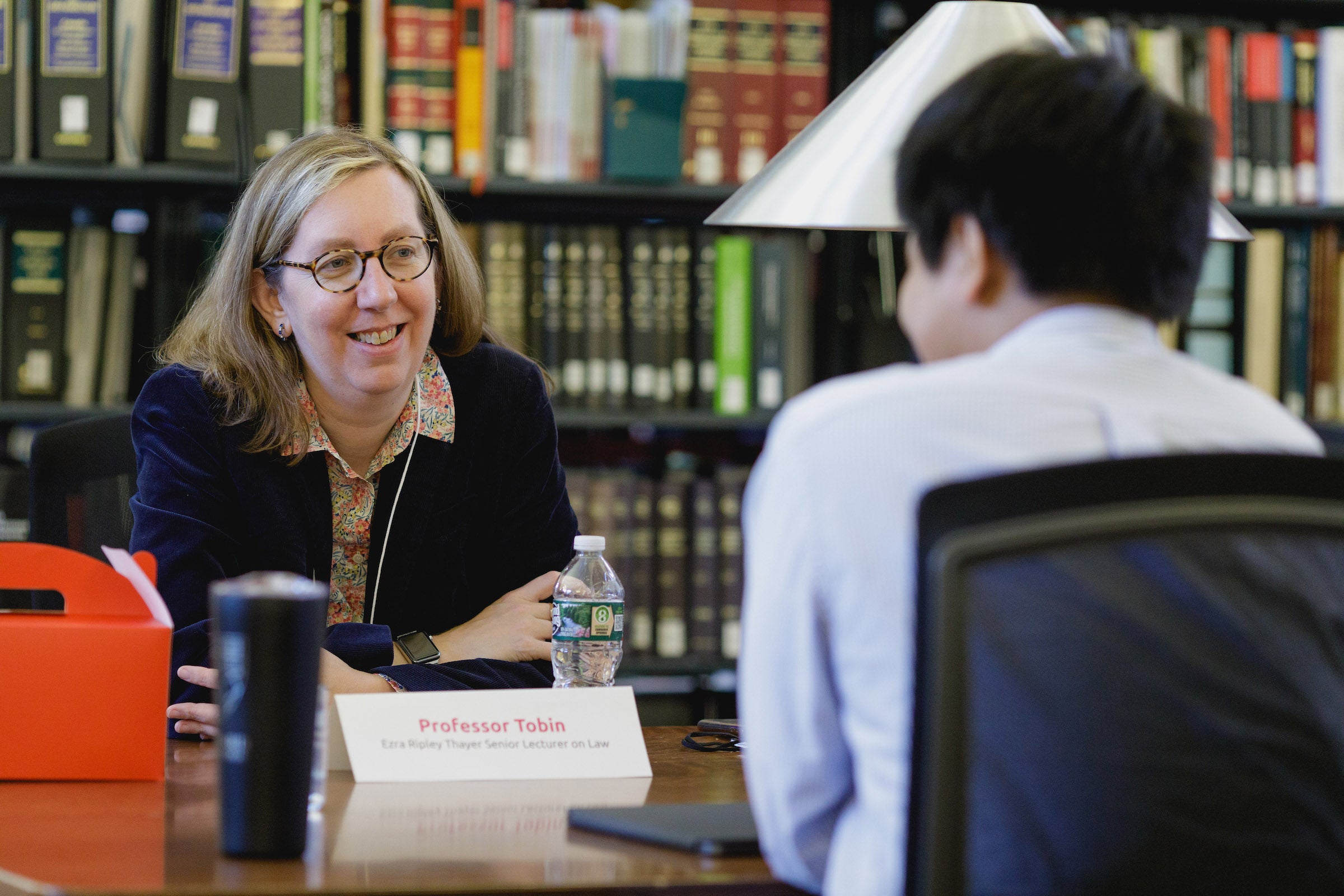As a lawyer, teacher, and director for the past 14 years of Harvard Law School’s First-Year Legal Research and Writing Program, Susannah Barton Tobin ’04 sees a lot of legal writing, some good, some less good. But she doesn’t entirely agree with the framing of a recent article in The Economist titled, “Why legal writing is so awful,” discussing a study published in the Proceedings of the National Academy of Sciences in which the authors blamed the continuing use of “arcane” and “archaic” legal lingo, in part, on what they perceived as lawyers’ tendency to imitate their predecessors’ poor prose.
Armed with two degrees in classics, a J.D. from Harvard Law, and years of writing and teaching experience, Tobin recently spoke to Harvard Law Today about the study and offered a few tips for new law students, long-time legal practitioners, and aspiring writers of all stripes. Above all, she says, before you open your laptop or pick up your pen, know your audience and what you are trying to achieve.

Harvard Law Today: Is legal writing as bad as The Economist and the study argue, or does it get a bad rap?
Susannah Barton Tobin: Legal writing has had a bad rap for as long as I can remember being involved in it, as a reader, as a student, and as a practitioner. But as a teacher, I think legal writing is writing. There’s good writing, and there’s bad writing, and there’s middling writing. And what we’re trying to do when we teach students how to write is to help them communicate as effectively as possible with the audience they’re trying to reach and with the particular purpose they have in mind.
I agree with the hypothesis that there’s path dependency bound up in legal writing, and particularly in the United States, where our common law tradition makes us want to stick with what has worked. But a simpler reason why some legal writing is bad is the same reason why some non-legal writing is bad: Writing well takes a lot of time and patience, particularly when you’re trying to explain complicated ideas, which lawyers almost always are trying to do.
HLT: Does it matter if legal writing is good writing?
Tobin: I teach legal writing, so of course I think it matters. It is advantageous for students and young attorneys to be known as good legal writers. Being able to explain what the law says and how it works in a clear and honest way is an essential skill to being a good lawyer and a good citizen in the democracy. From a professional perspective, you advance further, faster if you’re known to be a reliably strong legal writer.
HLT: Where do you see bad legal writing the most?
Tobin: The two categories the study emphasized were contracts and statutory language. And it makes sense why those would be where you would start. They’re both notably long and complicated. A lot of cooks are involved, particularly with legislation, where you have lawmakers and lobbyists and all kinds of feedback and last-minute changes. There’s a great quote from [former U.S. Senator from Wisconsin] Russ Feingold ’79, after he was the only senator to vote against the Patriot Act. When they asked him why he had voted no, he said “Because I read it.” That was a particularly political point. But it speaks to the fact that nobody’s able to sit down and read these legislative documents start to finish. Is Congress trying to create something that people are going to read and be able to understand? I’m not sure that’s really what is happening anymore with legislation. So, is that a feature or a bug? It may be a feature for the people trying to pass the law, but it’s a huge bug for people who are trying to figure out what’s going on.
HLT: Where do you see the best legal writing?
Tobin: Brief writing, particularly at the highest levels of the federal courts, is where you see some of the best writing, partially because the stakes of the disputes are so high and so publicly salient. When my students are looking for good legal writing, I encourage them to read briefs that are coming out of the Office of the Solicitor General, briefs that are coming out of nonprofits and firms that practice regularly before the Supreme Court.

HLT: So, it sounds like a lot of this comes down to, as most writing does, a question of audience?
Tobin: I think that’s exactly right. And that’s why I’m not a big fan of the idea that legal writing is a totally separate animal from any other writing. If you haven’t thought about your audience, then why are you doing the writing? A former editorial writer for The New York Times, Verlyn Klinkenborg, wrote this really helpful book called “Several Short Sentences About Writing.” And he’s got this particularly memorable point about composing a sentence: Once you write a sentence, it’s an orphan that you send out into the world and you can’t accompany it to help explain it, or to say “This is what I meant. You didn’t understand what I meant. But here’s what I meant.” And that’s the conversation I regularly have with students.
HLT: Has the amount of writing that practicing lawyers do changed over time?
Tobin: That’s an empirical question. I had a conversation with a judge I clerked for in the early 2000s, who wondered why opinions were getting so long: “Why can’t we write an Oliver Wendell Holmes, Jr. style short opinion?” Part of it is the common law tradition, in which we’re always accumulating more precedent, more statutory language, new sources, and more context for any dispute that arises. If you want to be thorough, you have to trace that evolution. So perhaps there’s more writing being done. On the other hand, lawyers are writing shorter pieces, maybe less formal contributions, than they did 30 or 40 years ago. What used to be a formal memo might now be a quick email with bullets outlining the most important points. So, I’m not sure that there is more or less writing being done, but the form of it and the speed with which it’s being requested may be changing.
HLT: Does the law still need to use Latin, which is a dead language, other than in the Vatican? Or does it just serve as a barrier to entry for non-Latin speakers?
Tobin: This is a fraught topic for me because I was fortunate to study Latin at the Vatican with the papal Latin secretary, the late Father Reginald Foster. So, I’ll have to fight the premise that Latin is bad as an absolute matter. Good writing often comes from a deep understanding of etymology, which comes in large part from a deep understanding of the Latin origins of English and of Latin rhetoric. We have learned a great deal, for example, from Cicero’s powerfully persuasive writing, including his legal arguments, or from the sharp clarity of Seneca. Of course, Latin is not the only influence on English language and law.
One of my favorite quotes on writing is from George Orwell’s “Politics and the English Language”: ”What is above all needed is to let the meaning choose the word and not the other way about.” One of the reasons writing takes time is that word choice matters. It’s good advice to remind students not to use $10 words when a 50-cent word will do. I don’t want my students going out of their way to use a polysyllabic word to show that they are smart. I know that they are smart. But I think the advice also runs the risk of proving too much, because English is a phenomenally rich language, influenced by Latin and other languages. And some words thought to be synonyms don’t mean exactly the same thing as other words. So sometimes, if you’re looking for a synonym, or you’re trying to be simple and direct, you can run the risk of losing nuance, and you run the risk of losing precision. And — maybe this is going too far — losing the chance for poetry in your writing, if you keep the vocabulary too narrow. And so, I guess I would have a plea for a middle ground, as Orwell suggests — choose the right word for the meaning you want.
But I also think Latin is used less today than it used to be in legal writing. Some Latin terms of art are, from our common law tradition, embedded in the law. Our students need to know what those words mean, so they can appreciate the meaning of a judicial opinion or the way a statute is constructed. But if you’re going to use Latin, you need to explain what it means. You don’t use it just as a bomb that you throw in the middle of a sentence to impress people or confuse readers.
So, should we be using Latin to gatekeep, to make it harder for people to understand? Absolutely not. But should we get rid of it entirely? Also no.
HLT: Do you have any legal writing tips for new students, upper-level students, or even practicing lawyers?
Tobin: My best advice for good writing is to read good writing. And so, even though they have many, many pages of required reading for class, I recommend to my students that they also keep reading narrative nonfiction, like articles in The New Yorker, because it’s like listening to music. If you have good rhythmic sentences in your head, if you hear the way someone puts together varied lengths of sentences and uses transitions well, and explains complicated concepts well, that sound will stay with you. I don’t know that I’ve convinced everybody to carry Ta-Nehisi Coates, Joan Didion, John McPhee, or Toni Morrison (not just her novels but essays) around with them, but I wish they would. I will give a shout-out to Chief Justice John Roberts ‘79 and Justice Elena Kagan ‘86, two of the best practitioners of legal writing. Their sentence-level writing is superb. Bryan Garner’s “Legal Writing in Plain English,” Third Edition is a particularly helpful guide. And if you’re having trouble figuring out what’s good legal writing, ask your faculty what they recommend.
HLT: So, improve your writing by reading good writing. Any other tips?
Barton Tobin: Justice Kagan likes to say that good writing is hard. It takes a lot of time. It takes multiple drafts. I think that advice can be frustrating to hear when time is limited. But it’s profoundly true. Certainly, when you’re learning a new genre, your work is not going to come out perfectly the first time. But sadly, or perhaps encouragingly, as a practitioner of legal writing, you’re never going to be done practicing. You’re always going to be working to get better. And so, we do drafts and revisions, and we receive feedback, from peers and from instructors. On the peer editing point, sometimes my students will say to me, “Well, we’re not lawyers yet. So how can we possibly give good advice to our peers about their drafts?” I say, “But you are readers, and you know how to respond to something if it doesn’t make sense. And the fact that it doesn’t make sense, actually isn’t your problem. It’s the writer’s problem. It’s not that you’re confused, but that the writing is confusing.” And so, being able to give constructive feedback, and to feel justified in giving that feedback, I think helps you become a good reader of your own prose and a good editor. You’re ultimately your own editor. At the end of the day, you’re responsible for what you submit. Whatever feedback you get, you’re developing the skill of incorporating multiple suggestions and making judgments about which changes you’re going to accept.
Finally, as a lawyer, and particularly as a litigator, you are a professional writer. And there is pleasure to be taken in crafting prose that is powerful and persuasive. As busy as lawyers are, the benefits of taking care with your words is professionally and psychologically huge. And so, I hope people remember that truth.
Want to stay up to date with Harvard Law Today? Sign up for our weekly newsletter.
